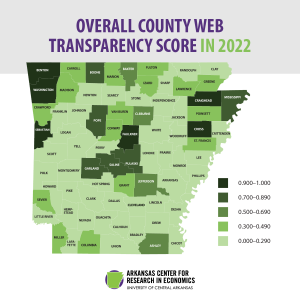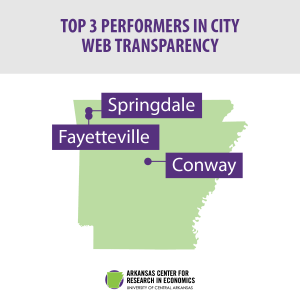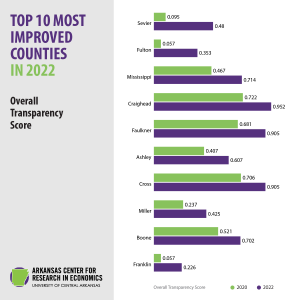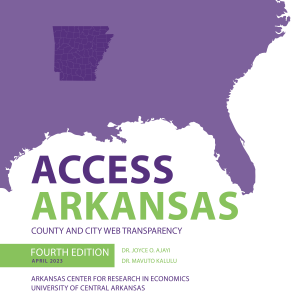By Michelle Stoll, ACRE Communications Manager
 The Arkansas Center for Research in Economics (ACRE) has released its 2023 County and City Web Transparency Report, Access Arkansas. The report assesses the information that county and city governments publish online, as well as how accessible that information is. Localities are then ranked according to this analysis. Previous reports focused on Arkansas counties, but this year’s report includes first-class cities (those with populations over 2,500) for the first time.
The Arkansas Center for Research in Economics (ACRE) has released its 2023 County and City Web Transparency Report, Access Arkansas. The report assesses the information that county and city governments publish online, as well as how accessible that information is. Localities are then ranked according to this analysis. Previous reports focused on Arkansas counties, but this year’s report includes first-class cities (those with populations over 2,500) for the first time.
Research shows that transparency increases accountability, instills fiscal discipline, improves economic performance, promotes trust between government and citizens, and reduces corruption. Overall, the current index shows that, on average, Arkansas counties publish about 37 percent of the important information included in ACRE’s index compared to about 15 percent in 2018. Only 20 out of 112 first class cities publish online at least 50 percent of public information included in the fiscal component of the transparency index.
“We’ve seen counties across Arkansas improve their scores since we began collecting data on Web transparency, and this year we are delighted to recognize the top-ranking cities and counties as well as the county that has most greatly improved their score,” said ACRE Director and UCA Associate Professor of Economics Jeremy Horpedahl.
Web transparency, and this year we are delighted to recognize the top-ranking cities and counties as well as the county that has most greatly improved their score,” said ACRE Director and UCA Associate Professor of Economics Jeremy Horpedahl.
The top-ranking cities are Conway, Fayetteville, and Springdale. Top ranking counties include Benton, Craighead, and Washington. Sevier County has shown the most improvement in Web transparency among all 75 Arkansas Counties since 2020. These localities express the importance of web transparency and recognize the value of ACRE’s report.
“We are constantly looking at ways to make our website better for our residents thanks to the ACRE transparency project. It is important that our residents know how funds are being used and that they have easy access to that information,” said Benton County Judge Barry Moehring. “We are encouraged to see the improvements other counties are making and look to them to see how we can also improve.”
“We’re proud to be recognized for our commitment to transparency and accessibility. Transparency means more than a catchy buzzword. To further build trust and accountability with the people of Conway we know we must continue to develop and maintain user-friendly transparency tools,” said Mayor Bart Castleberry. “I’m proud of our departments, our boards, our commissions, and the Conway City Council for working together to get the job done.”
“ACRE’s transparency project has been a game changer!” said Craighead County Administrator Lisa Lawrence. “The assessment of our page has caused us to evaluate our website and review the suggestions that are given by ACRE and try to implement them into our site. We look forward to the transparency report and try to improve in our ranking each time. We also review the top ranked sites and learn from their rankings and recommendations.”
“The City of Fayetteville is committed to transparency,” said the City’s Communications Director Lisa Thurber. “Every department within the City works diligently to publish information that will help keep residents informed about how their tax dollars are at work across the community. We are delighted and honored to have these efforts recognized by the Arkansas Center for Research in Economics web transparency report.”
 “Our business in county government is ultimately about the citizens that we serve, and to be able to serve our citizens we have to continue to move forward with the digital world,” said Sevier County Clerk Renea Bailey. “It’s an honor to be recognized for the work being done in Sevier County.”
“Our business in county government is ultimately about the citizens that we serve, and to be able to serve our citizens we have to continue to move forward with the digital world,” said Sevier County Clerk Renea Bailey. “It’s an honor to be recognized for the work being done in Sevier County.”
“In an age where the public can be easily misinformed by so many unreliable sources, it is imperative that we, as a City, have the ability to communicate directly to our residents, ensuring they have a consistent, reliable, and transparent resource for any information they need,” said Springdale Mayor Doug Sprouse.
“As leaders of local governments, one of our top priorities is making sure we are conducting our constituents’ business in the most transparent means possible, ” said Washington County Judge Patrick Deakins. “ACRE’s transparency project has been a great resource for us to assess where we stand amongst our peers. The project spurs healthy competition while at the same time accommodating information sharing on best practices. This allows us a process for continuous improvement.”
ACRE’s transparency index is calculated by assessing the information that county and city governments publish on their websites and the Arkansas.gov and artransparency.gov platforms. It identifies the counties and cities that are best and worst in web transparency overall and quantifies their strengths in three overarching kinds of transparency: fiscal, administrative, and political.
Of the three types of transparency ACRE evaluated, Arkansas counties improved the most in fiscal transparency. They went from publishing seven percent of fiscal information in 2018 to 53 percent in 2022. “We attribute this improvement to Act 564, which became law during the 2019 Arkansas Legislative session,” said Dr. Joyce Ajayi, ACRE policy analyst and co-author of the report. “Act 564 mandates counties to publish their fiscal information online. Before that time, just a handful of counties were doing that, but now all counties publish their budgets online through a website maintained by the Arkansas Association of Counties.”
 “Access Arkansas is valuable for Arkansas residents because it lets them know the level of government transparency in their local governments and the improvements their government officials are making and need to make,” explained Horpedahl. “It also provides researchers and policymakers with the necessary data to analyze the relationship between transparency and economic and socioeconomic factors in Arkansas.”
“Access Arkansas is valuable for Arkansas residents because it lets them know the level of government transparency in their local governments and the improvements their government officials are making and need to make,” explained Horpedahl. “It also provides researchers and policymakers with the necessary data to analyze the relationship between transparency and economic and socioeconomic factors in Arkansas.”
